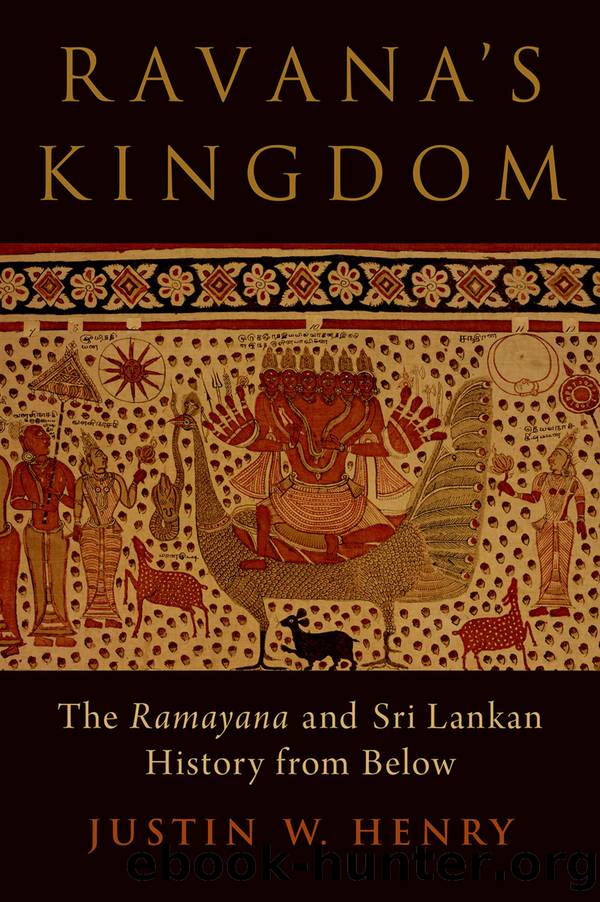Ravana's Kingdom by Justin W. Henry;

Author:Justin W. Henry;
Language: eng
Format: epub
Publisher: Oxford University Press USA
Published: 2022-01-15T00:00:00+00:00
The Ravana Balaya gained notice in 2013 for staging a 250 kilometer âpilgrimageâ from Kataragama to Colombo to present a petition to then President Mahinda Rajapaksa insisting that the government stop spending resources on the certification of Halal meat.21 The group has since then demanded that Muslim refugees from Pakistan be closely monitored by the government,22 advocated a ban on imported Tamil films, threatened to throw eggs at Sri Lankan cricketers defecting to Indian teams,23 and interrupted a number of Christian Evangelical prayer meetings in Polonnaruwa (responding to alleged complaints over pastors converting Buddhists and Hindus in the area).24 The Ravana Balayaâs opposition to cow slaughter on Buddhist humanitarian grounds recapitulates a hot-button issue for Indian Hindu nationalists, with obvious implications for Muslims who eat beef but not pork.25
A principal concern of the Ravana Balaya is the preservation and memorialization of historical sites bearing significance to the Sinhala Buddhist heritage, from their point of view. The most contentious such site at present is Kuragala, a town in the remote hills of the islandâs south-central highland, seat of the devotional cult of Muhiyadeen Abdul Qadir al-Jilani (1078â1166). Al-Jilani was a Persian Sufi mystic whom local Muslims believe to have visited Sri Lanka during the twenty-five-year gap in his recorded biography, having spent this time meditating for twelve years in a secluded cave at Kuragala, while looking out a small aperture in the rock toward Mecca. Interest in the site was renewed in the late nineteenth century through the Muslim merchant community of nearby Balangoda, with an open-air mosqueâDafther Jailaniâconstructed in 1922. On the basis of second-century BraÌhmÄ« inscriptions noted in the area, from the 1970s claims began circulating that Dafther Jailani had in fact been built on the ruins of an ancient Buddhist temple, spurring demands that the government step in to intervene against Muslim destruction of a Buddhist archaeological heritage site. Under the authorization of the Archaeological Department, the stateâs Ministry of Cultural Affairs proceeded to build a âreconstructionâ of a small reliquary mound at the summit of the hill above the cave associated with al-Jilani. The dagoba was left unfinished due to the successful legal intervention of the chief trustee of the Dafther Jailani shrine, H. L. M. Aboosally, at the time Member of Parliament for the Balangoda constituency.26
The campaign to reclaim Kuragala for Sinhala Buddhists intensified again in 2013, when, at a rally in Kandy on March 17, Bodu Bala Sena leader Rev. Galagodatte GnÌaÌnissara told the crowd to âget ready to celebrate Wesak [the most important annual Buddhist holiday] at Kuragala!â Supported by the Sinhala Ravaya and Ravana Balaya, the Bodu Bala Sena publicly advocated that Dafther Jailani be dismantled and relocated to the town of Balangoda, thus leaving the disputed premises free for archaeological exploration and, eventually, reclamation as an active Buddhist devotional space.27 The following month, Gotabaya Rajapaksa, at the time Secretary of Defense (currently the nationâs President), intervened ordering the Defense Ministry to clear the Dafther Jailani shrineâs four-acre premises of all buildings except for standing Muslim tombs and the mosque itself.
Download
This site does not store any files on its server. We only index and link to content provided by other sites. Please contact the content providers to delete copyright contents if any and email us, we'll remove relevant links or contents immediately.
Phoenicians among Others: Why Migrants Mattered in the Ancient Mediterranean by Denise Demetriou(536)
Caesar Rules: The Emperor in the Changing Roman World (c. 50 BC â AD 565) by Olivier Hekster(497)
Europe, Strategy and Armed Forces by Sven Biscop Jo Coelmont(471)
Infocracy by Byung-Chul Han(456)
Reading Colonial Japan by Mason Michele;Lee Helen;(435)
Banned in the U.S.A. : A Reference Guide to Book Censorship in Schools and Public Libraries by Herbert N. Foerstel(431)
The Roman World 44 BC-AD 180 by Martin Goodman(417)
Give Me Liberty, Seventh Edition by Foner Eric & DuVal Kathleen & McGirr Lisa(413)
DS001-THE MAN OF BRONZE by J.R.A(405)
Introducing Christian Ethics by Samuel Wells and Ben Quash with Rebekah Eklund(403)
The Dangerous Life and Ideas of Diogenes the Cynic by Jean-Manuel Roubineau(402)
The Oxford History of World War II by Richard Overy(396)
Imperial Rome AD 193 - 284 by Ando Clifford(393)
Literary Mathematics by Michael Gavin;(359)
Language Hacking Mandarin by Benny Lewis & Dr. Licheng Gu(331)
The Oxford History of the Renaissance by Campbell Gordon;(323)
How to Reach the 9.0 in IELTS Academic Reading by IELTS Medical(321)
The Compleat Victory by Kevin J. Weddle(311)
The Manual of Photography by Elizabeth Allen & Sophie Triantaphillidou(301)
